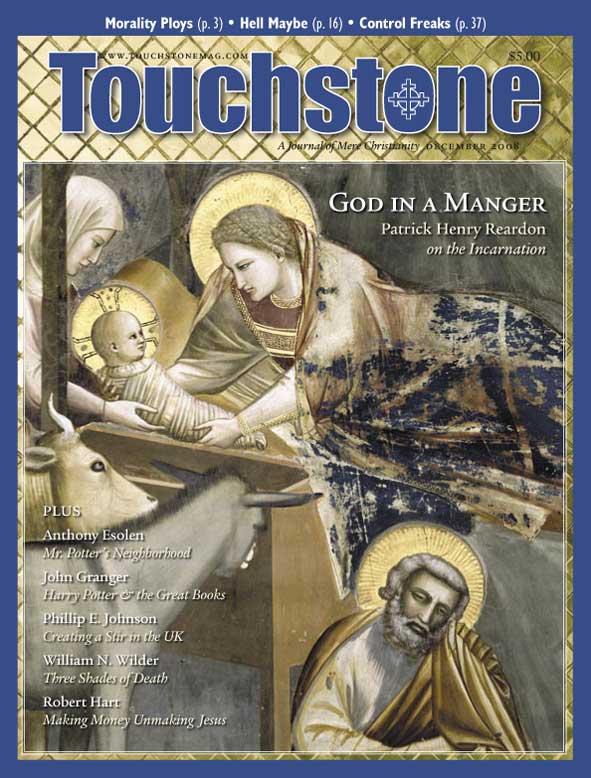Book Binders
What I Learned About the Great Books & Harry Potter
by John Granger
Harry Potter or “Potter mania” is a counter-cultural phenomenon on several counts, but the most unusual, special, even mind-boggling one may be the fact that Americans, young and old, in groups ranging in size from a handful of people at a local library to hundreds of attendees at FanCons and universities, will travel no little distance and spend time they could be using “more productively” to listen to a lecture about books they have read. These books and the ideas in them are defining a generation’s mental landscape, and, not to exaggerate the effect, shaping an important part of their future.
In an Esquire article entitled “Death by Harry Potter,” Chuck Klosterman, a “talking head” or authority on popular culture, admits that he knows almost nothing about Harry Potter because he has chosen not to read the books or see the movies. He also admits that this choice is hastening the end of his career as a pundit.
An entire generation (or two) of readers has read this 4,100-page story again and again and seen the blockbuster movies repeatedly. The coming decades promise, consequently, to be all about Harry, as his story shapes public conversation. As Klosterman writes (emphasis his):
I find it astounding that the unifying cultural currency for modern teenagers are five-hundred-page literary works about a wizard. We are all collectively underestimating how unusual this is. Right now, there is no rock guitarist or film starlet as popular as J. K. Rowling. Over time, these novels (and whatever ideas lie within them) will come to represent the mainstream ethos of our future popular culture. Harry Potter will be the only triviality that most of that coming culture will unilaterally share.
And I have no interest in any of it.
And I wonder how much of a problem this is going to become.
The bookish kids reading Harry Potter novels may not go on to control the world, but they will almost certainly go on to control the mass media. In fifteen years, they will be publishing books and directing films and writing broad jokes for unfunny situation comedies that will undoubtedly be downloaded directly into our brains. And like all generations of artists, they will traffic in their own nostalgia. They will use their shared knowledge and experiences as the foundation for discourse. So I wonder: Because I don’t understand Harry Potter, am I doomed to misunderstand everything else?
Yes, Chuck, you are.
I say this with some confidence not because Klosterman himself argues that this will be the case in the rest of his article or because, since I am a Potter maven myself, this conclusion feathers my nest, though both of these things are true. No less a thinker than Allan Bloom taught me too many years ago that “shared books” are the foundation of culture, politics, and individual thinking. And Harry Potter is the “shared text” of the twenty-first century.
Unaware Relativists
The first week at the University of Chicago for undergraduates is orientation week, where, as at every college, you find out where you’ll be living, what classes you’ll be taking, and if you can learn to keep down the cafeteria food. The main thing I remember about my first days at “The College,” though, was “The Aims of Education Address.” It was a really big deal. First, you listened to one of the university’s best thinkers give a lecture on the meaning of education to the incoming class (and half the faculty and upperclassmen, who snuck in; Rockefeller Chapel is much more a Hogwarts-esque cathedral than a Quaker meeting house). Then you returned with your classmates to your College House (dormitory) to discuss the lecture with your Head of House and a guest from the faculty.
I went to the talks every year I lived in Hyde Park, but none was as memorable as the first, given by Allan Bloom, professor in the College and member of the Committee on Social Thought. Later famous for his book, The Closing of the American Mind, Bloom was then just a Campus Giant. Because our Head of House was Paul Wheatley, the chairman of the Committee on Social Thought and a good friend of Bloom’s, Bloom came to our house to answer questions after giving the “Aims of Education Address.” I doubt that any of the forty people there will ever forget that Q&A session in Hitchcock Hall’s swank Green Room that evening. Several of us were changed forever by it.
As Bloom entered, I heard him mutter to Mr. Wheatley that he had “more in common with baboons than this lot; what can you expect me to say to them, Paul?” in his unforgettable intonation, which every undergraduate could and did impersonate.
I was shocked and more than a little put off. “Who does this guy think he is?” I remember wondering. I followed him in and found a seat by the windows looking out over the quadrangle. The “Aims of Education Address” had been excellent, but, truth be told, I was more interested in winning the attention of the young woman from Guam I had just met.
Bloom banished those thoughts in quick order, albeit only temporarily. To help us understand the value of the “Core Curriculum” we were about to begin, he began with brief remarks about, of all things, relativism. After just a few minutes of asking us questions in inimitable Socratic fashion, our answers and, as telling, our inability to answer exposed us as relativists, and, worse, as relativists who were not even aware that we were relativists. Bloom described our reaction in The Closing of the American Mind:
There is one thing a professor can be absolutely sure of; almost every student entering the university believes, or says he believes, that truth is relative. If this belief is put to the test, one can count on the students’ reaction: they will be uncomprehending. . . . The relativity of truth is not a theoretical insight but a moral postulate, the condition of a free society, or so [the students] see it. They have all been equipped with this framework early on, and it is the modern replacement for the inalienable natural rights that used to be the traditional American grounds for a free society. That it is a moral issue for students is revealed by the character of their response when challenged—a combination of disbelief and indignation: “Are you an absolutist?,” the only alternative they know, uttered in the same tone as “Are you a monarchist?” or “Do you really believe in witches?”
Having pulled down our collective conceptual pants and revealed underwear and foundations even we didn’t know we were wearing, Bloom wanted to discuss why we thought this way and what could be done to correct our deficiencies, if anything.
Two-Level Tragedy
His question for us to begin our search for the fount of our ignorance and unconsciousness was, “What books do you all have in common?” He asserted that our grandparents’ great-grandparents, as backward as we might imagine them because they didn’t have televisions, cassette players, or electric typewriters (this was 1979) had had close to a memorized knowledge of the Bible, Pilgrim’s Progress, and Plutarch’s Lives of the Noble Greeks and Romans. He asked if any of us could say he had read all three of those books and had facility with the names of the major and minor characters in each. This was a pretty nerdy lot of teenagers but, of course, none of us could say yes.
He explained that this was a tragedy on two levels.
As individuals, we were impoverished because what we had read and studied instead of these books was almost certainly less than substantial or edifying. And the television programs, music, and movies we enjoyed were, he suggested, demeaning and soul corrosive. (He said this as a Platonist, incidentally, not in light of any religious beliefs or Puritanism. I remember a Greek class with Bloom in which he had a pipe, cigar, and cigarette going despite the several signs on the classroom wall that read “No Smoking.”)
In the culture, however, the damage of our mis-formation was much greater and would be what cemented our ignorance, if left uncorrected. In a nutshell, we had no texts in common that could shape public discourse or guide our conventions. Bereft of a base in Scripture, literature, and history, we were a lost generation.
The most unsettling part of this Socratic surgery was that it was delivered in the gentlest way with only a hint of condescension and condemnation. He spoke to us as an older man might who was helping a group of very young children discover for themselves by question-and-answer that the world was not flat. Bloom knew our mind-boggling ignorance and self-importance weren’t our fault, if it was plain that amending the situation was our responsibility and a large undertaking.
He was happy to tell us that we had come to the right school in which to fill our Lake-Michigan-sized scholastic lacunae. But he wasn’t going to let us leave the room thinking we knew anything of substance or virtue—no matter how many 5s we had on our Advanced Placement tests—nor with our identities as “thoughtful people leading an examined life” intact. I left the Green Room hoping the young lady from Guam wouldn’t think I was a total relativist bumpkin unworthy of her attention.
Not One Book
The nightmare and gravity of Mr. Bloom’s revelations to us that evening were that he was right in thinking of us as baboons with whom he had little in common. We were a generation without common texts of any kind.
I remember ten of us sitting together in the tiny break room of Regenstein Library a few weeks later, trying to figure out what books we had in common. We were all Americans born between 1957 and 1962, we represented all four US time zones, and our backgrounds spanned a broad economic and educational spectrum. Eggheads all, we considered ourselves to be “America’s future” as much as any of us could think of a future beyond girls from Guam. We were confident that Bloom had overstated the case of our ignorance and our generation’s not having any shared texts.
After an hour of tossing around the titles of books, poems, and plays, however, we had to admit defeat. Nothing of greater depth than Dr. Seuss had been read by more than six of us. The Rime of the Ancient Mariner? You’re kidding. Romeo and Juliet? Nope. Lord of the Flies? Unh-uh. Not even Jonathan Livingston Seagull.
Not one book. Not even one comic book. The only thing we had in common besides a few movies that none of us had seen more than once back in those Dark Ages before DVDs was . . . Batman television programs.
Together we were able to name close to thirty Batman super-villains, from IceMan to Ma Parker (I learned later that the only ones we didn’t get were one-show-appearance bad guys). There was much laughter as we shouted out super-bad-guy names and recalled Adam West’s beer gut and the conversations he had with Robin as they climbed up the sides of buildings.
But I was also sobered by this experience, and I wasn’t alone. We had nothing in common on which to build a conversation except campy parodies of super-hero comic books. “Holy Wasteland and Hollow Men, Batman!”
The College had a solution for our problem, of course: fire-hosing us with the Great Books and immersing us in conversations about what they meant. I’m pretty sure everything I’ve written about Harry Potter as literature and as cultural phenomenon was shaped by that painful four-year chrysalis on the south side of Chicago.
But while those years of learning were life-changing for me individually, they didn’t affect the culture at large. I may have read and wrestled with Plato and Aristotle, Homer and Virgil, Kafka, Mann, and Brecht, and a host of other dead white men, but what I had in common with most of my contemporaries was still just memories of Cesar Romero’s Joker and Frank Gorshin as The Riddler.
Five Cheers for Harry
With the advent of Harry Potter, of course, this failing has been corrected in a way that wouldn’t have been conceivable fifteen years ago. Literature mavens like Harold Bloom (not to be confused with Allan) may think Harry Potter little better aesthetically or thematically than Batman TV serials, but even the Ivory Tower and Christian Ghetto residents who hate Harry hate him in large part because they fear the depth of influence he will have on young hearts and on the culture they will grow up to shape. Like it or not, we now have a shared text.
I think this is a good thing. Here are five reasons why:
1. There is no relativism in the Harry Potter novels. In the good-versus-evil sub-creation from Ms. Rowling’s imagination, not everyone is a white hat or a Death Eater, but there is very real wickedness in the visible world and the possibility of internal failing as well. The characters who are “soft on Voldemort” are just as much villains as are the truly twisted and fallen characters.
Though the books are, as Rowling always reassures the press, fictional expositions of Locke’s Doctrine of Tolerance, they are about a tolerance that means loving acceptance of the different rather than excusing or ignoring moral evil. Harry Potter’s heroes are sufficiently charitable and mentally discriminating to fight for the right and defend the innocent from the wicked.
2. The books, as books, invite readers to read more books. As Klosterman wrote, it is nigh on incomprehensible that children, young adults, and older adults are not only reading a shared text but a very long and very involved text. As with the White Witch of Narnia’s Turkish Delight, once a person has had the pleasure of being engrossed in the written work of a master storyteller, he will want more for the rest of his life. Better yet, because these novels are a “rowling” together of ten different literary genres, they create an appetite for a variety of fiction, including detective stories, Gothic adventures, alchemical drama, fantasy, satire, Bildungsroman, and even manners-and-morals books à la Jane Austen.
Harry Potter isn’t the gateway to the occult but a portal to a lifetime of edifying reading. The Harry Potter generation will be a generation that reads for pleasure. This in itself represents a significant cultural shift in the offing.
3. The stories have a challenging message for postmodern readers. J. K. Rowling is a writer of our times who writes about the questions and concerns that consume everyone living in this historical period. She has succeeded in smuggling in a great deal of traditional, even transcendent, material and themes into these stories—including her Christian beliefs—in answer to these questions and concerns. The “religious undertones,” as she has said, are “obvious” to anyone who hasn’t been immunized to this possibility, but that the shared text of the first truly global generation works to baptize their collective imagination is still astonishing.
For example, in the “King’s Cross” chapter of Harry Potter and the Deathly Hallows, Voldemort is shown as a tortured soul in agony who cannot be helped post mortem. Could any other author have sneaked the message of punishment in the afterlife for sinners past the “watchful dragons” of materialistic tweens? Or the message of the power of a pure heart to confront evil, or of love to conquer death? This is a message and artistry Bunyan would have loved.
4. The shared text is ubiquitous. If he doesn’t color every event and medium available in the 24/7 glut of information and entertainment options and vehicles, Harry Potter is nevertheless available and prominent in each. Thousands of Potter fan sites are still thriving; Wizard Rock bands (“Wrock”) are featured on stages in every major city every weekend and gather their legions of fans for festivals; and ancillary Potter books are bestsellers months before their publication.
When New York Times columnist Maureen Dowd wanted to smear Governor Sarah Palin, her tactic was to suggest that, as mayor of Wasilla, Alaska, Palin wanted to ban Harry Potter novels from the local library. This was about the most damning accusation Dowd could have made against Palin in the public square (also a false one, it should be noted; the Potter books weren’t even in print at the time)—on par with calling her a creationist or a believer in absolute monarchy. Like it or not, for the “Harry Potter generation,” there may be no greater heresy, token of ignorance, or insult to their collective understanding of the world than to suggest that one might be a fundamentalist Harry hater.
5. The author is making an argument—and an important one. We have reason to celebrate this seeming Potter saturation point we’ve reached.
Rowling spent five years planning the series before beginning to write it, and she planned each book for close to six months before putting pen to legal pad. The payoff from these preparations are novels that operate on the four levels of symbolic art that Dante asked his readers to look for in his work. Understanding their superficial, moral, allegorical, and mythic or anagogical meanings requires some appreciation of English literature and symbolism, as well as the meditative, “slow mining” that Ruskin said the best books demand and reward.
Preposterous? In Deathly Hallows, the mystery that drives a large part of the story turns on the interpretation of a symbol, the “Triangular Eye” of the Hallows. Rowling includes four other eye symbols in this last book, which is largely about Harry’s “corrected vision” and right understanding consequent to his loving sacrifice of himself to save his friends. These symbols, along with Rowling’s alchemical scaffolding for the series, and her frequent reminders in the story that “the inside is greater than the outside,” are pointers to what Northrop Frye called “the iconological tradition” and the sacramental vision of what C. S. Lewis called the “Seeing Eye” continuous with the “unity of existence.”
It is easy to dismiss the Potter novels as “slop” because, as Potter admirer James Thomas of Pepperdine University has noted, they strike most academics as “too current, too juvenile and too popular.” They are anything but ontologically flat, however; rather, they foster a view of things and persons that is not superficial in the literal sense of being “about surfaces.” Rowling urges her readers to look beneath the story’s narrative line until they find the meaning and experience of parable and myth that Dumbledore tells Harry is a “power beyond the reach of any magic.”
An Invitation
Before meeting Allan Bloom and, through him, the Western canon, my friends and I were a sarcastic and self-absorbed, if good-hearted lot, nourished on stories that were only diversion and dissipation. I have to think my children are better prepared and more willing to embrace that tradition than I was because of their years of instruction at Hogwarts castle.
I struggle to think of any fictional work of the last two or three centuries that had the potential to shape the cultural and political agendas of its time as this one does. Dickens’s crusading social novels? Uncle Tom’s Cabin? The Jungle? Harry Potter differs from these in that the others ignited a latent Christian conscience. The Potter novels help foster one into existence.
Chuck Klosterman regrets the dawn of a Harry Potter generation but acknowledges it. I join him in pointing to the elephant at the door but rush to usher the pachyderm in. Harry is not the Bible, Pilgrim’s Progress, or Plutarch’s Lives; it is, however, a shared text and a profound one operating on many levels.
From this text, we can build a conversation about virtue and vice, and about what reading does to the right-side-up soul. From it, too, we can take an invitation to go on to even better books—ones that our grandparents’ great-grandparents had in common, and others that our children may one day write. Hasten the day!
John Granger is an Orthodox Reader and the author of several books about Harry Potter, including How Harry Cast His Spell (SaltRiver, 2008) and The Deathly Hallows Lectures (Zossima Press, 2008). His website is HogwartsProfessor.com.
subscription options
Order
Print/Online Subscription

Get six issues (one year) of Touchstone PLUS full online access including pdf downloads for only $39.95. That's only $3.34 per month!
Order
Online Only
Subscription

Get a one-year full-access subscription to the Touchstone online archives for only $19.95. That's only $1.66 per month!
bulk subscriptions
Order Touchstone subscriptions in bulk and save $10 per sub! Each subscription includes 6 issues of Touchstone plus full online access to touchstonemag.com—including archives, videos, and pdf downloads of recent issues for only $29.95 each! Great for churches or study groups.
Transactions will be processed on a secure server.
more from the online archives
calling all readers
Please Donate
"There are magazines worth reading but few worth saving . . . Touchstone is just such a magazine."
—Alice von Hildebrand
"Here we do not concede one square millimeter of territory to falsehood, folly, contemporary sentimentality, or fashion. We speak the truth, and let God be our judge. . . . Touchstone is the one committedly Christian conservative journal."
—Anthony Esolen, Touchstone senior editor









